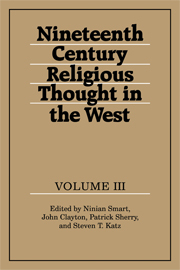Book contents
- Frontmatter
- Contents
- Preface
- 1 RELIGION AND SCIENCE
- 2 FRIEDRICH NIETZSCHE
- 3 JEWISH THOUGHT
- 4 THE STUDY OF THE OLD TESTAMENT
- 5 THE STUDY OF THE NEW TESTAMENT
- 6 FRIEDRICH MAX MÜLLER AND THE COMPARATIVE STUDY OF RELIGION
- 7 THE ANTHROPOLOGY OF RELIGION: BRITISH AND FRENCH SCHOOLS
- 8 MAX WEBER AND GERMAN SOCIOLOGY OF RELIGION
- 9 ERNST TROELTSCH
- INDEX
4 - THE STUDY OF THE OLD TESTAMENT
Published online by Cambridge University Press: 26 January 2010
- Frontmatter
- Contents
- Preface
- 1 RELIGION AND SCIENCE
- 2 FRIEDRICH NIETZSCHE
- 3 JEWISH THOUGHT
- 4 THE STUDY OF THE OLD TESTAMENT
- 5 THE STUDY OF THE NEW TESTAMENT
- 6 FRIEDRICH MAX MÜLLER AND THE COMPARATIVE STUDY OF RELIGION
- 7 THE ANTHROPOLOGY OF RELIGION: BRITISH AND FRENCH SCHOOLS
- 8 MAX WEBER AND GERMAN SOCIOLOGY OF RELIGION
- 9 ERNST TROELTSCH
- INDEX
Summary
The nineteenth century witnessed a remarkable transformation in the study of the Old Testament both on account of what was discovered about this literature and even more especially in connection with the context of religion and research in which its writings were investigated. Until the close of the preceding century the writings of the Old Testament had been studied and commented upon without any serious break since the basic form of the canon had been established. Yet this had been undertaken almost exclusively within the framework either of Christianity or of Judaism, and within surprisingly firmly set lines of interpretation. It is now clear in retrospect that these main lines of interpretation had largely established themselves within the first three centuries of the Christian era, those of the Christian Church being outlined and given authority by the New Testament, and those of Judaism finding their classical expression, first in the Mishnah and then in the Talmud. In spite of some significant epochs of debate and dialogue between these two traditions, which had both been built upon the Old Testament, the differing hermeneutical principles and assumptions which each had adopted precluded any very extensive cross-fertilization between them. Only rarely, as in the writings and work of J. J. Reuchlin (1455–1522) and Hugo Grotius (1583–1645), were significant efforts made by major Christian scholars to draw upon the interpretative traditions of Judaism in regard to the Old Testament.
- Type
- Chapter
- Information
- Nineteenth-Century Religious Thought in the West , pp. 109 - 142Publisher: Cambridge University PressPrint publication year: 1985
- 1
- Cited by

